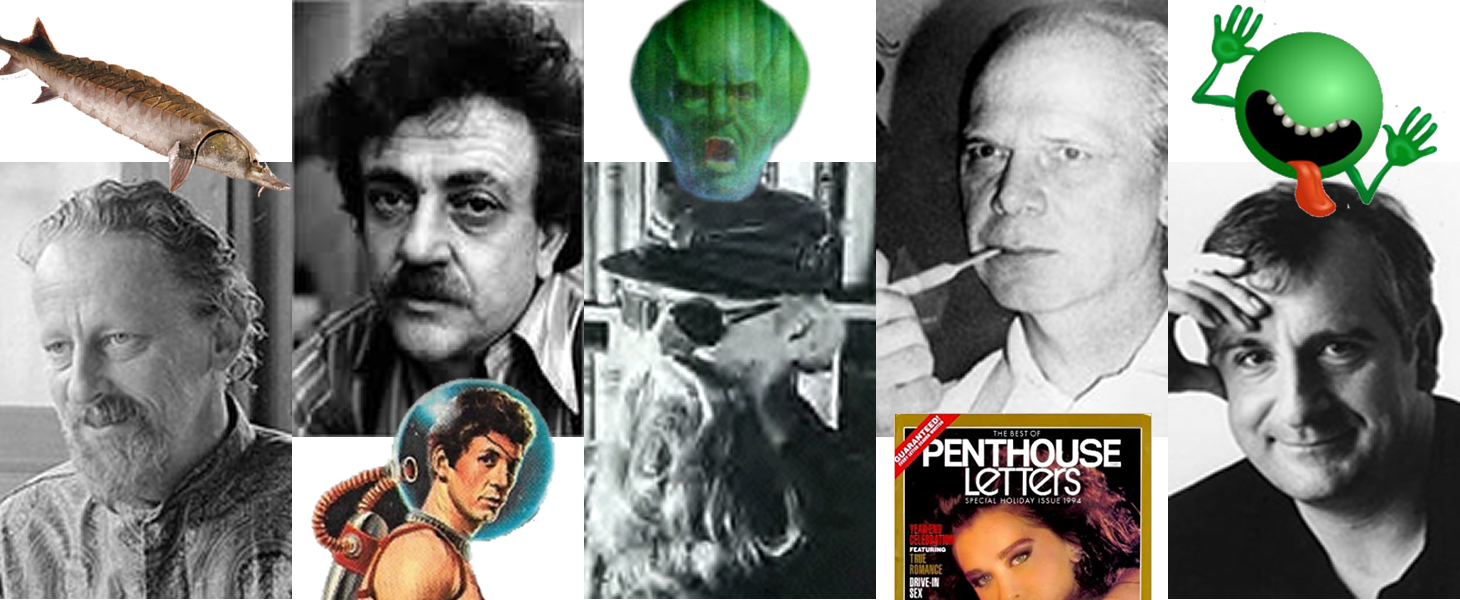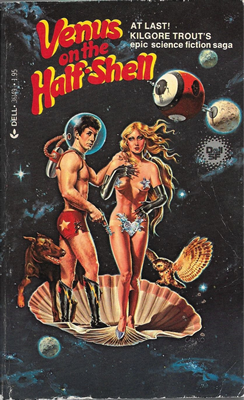
I credit (or blame, as the case may be) my friend Todd and my friend Rob for turning me on to The Hitchhiker’s Guide to the Galaxy. So let’s talk about Kurt Vonnegut.
Vonnegut1 was one of those important authors who make you feel vaguely guilty, given that you’ve never read any of his stuff except maybe Slaughterhouse-Five. And while some of his stuff is dystopian or mildly sci-fi, where do I get off saying he, not Douglas Adams,2 is responsible for a sprawling sci-fi epic like The Hitchhiker’s Guide to the Galaxy?
Stay with me here: In 1965, Vonnegut published God Bless You, Mr. Rosewater, which included a lengthy excerpt from a fictional novel titled Venus on the Half-Shell, by a fictional author named Kilgore Trout.3
Kilgore Trout showed up frequently in Vonnegut’s work as a literary alter ego for Vonnegut himself, but Trout’s name was also a poke at Vonnegut’s friend, sci-fi author Theodore Sturgeon:4 “I think it’s funny to be named after a fish,” were Vonnegut’s exact words (he may have been a great writer but apparently part of him never left middle school).
Another sci-fi author, Philip Jose Farmer,5 was so amused he snagged the Venus on the Half-Shell excerpt in God Bless You, Mr. Rosewater and fluffed it up into an entire book.
And so, in 1975, Venus on the Half-Shell hit the bookstores, just three years before The Hitchhiker’s Guide to the Galaxy began on BBC Radio. The byline read Kilgore Trout, but the author was really Philip Jose Farmer, using characters created by Kurt Vonnegut.
Got all that?
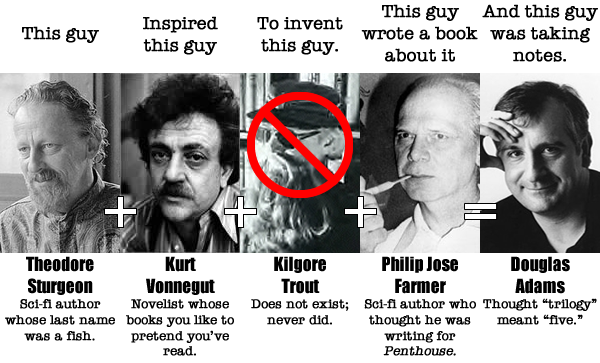
What does this have to do with Douglas Adams or Hitchhiker’s Guide to the Galaxy? Adams was a huge fan of Vonnegut, for one thing. That’s not tantamount to plagiarism, of course. But if you’ve ever read, listened to or watched Hitchhiker’s Guide to the Galaxy, you’ll notice some startling parallels:
1. The Everyman Galactic Wanderer
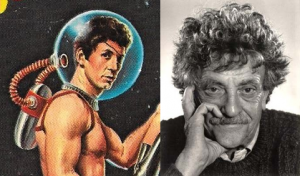
Both stories follow the adventures of an everyday schlub snatched from his everyday schlub’s life into an intergalactic adventure. HHGTTG stars Arthur Dent, who worked in a small radio station before roaming the cosmos in a bathrobe.
VOTHS, on the other hand, stars Simon Wagstaff, a folk musician who likes wearing faded jeans and comfy old sweatshirts. He has curly dark hair, a big nose and looks a lot like Kurt Vonnegut.
2. The Earth Gets Destroyed by Bureaucrats
When Hitchhiker’s Guide begins, Arthur Dent is lying in the mud in front of his house, blocking the bulldozers that have shown up to demolish his house. At the beginning of Venus on the Half-Shell, Simon Wagstaff and his girlfriend are having sex on the head of the Sphinx in Egypt.
Oh. This would be a good place to explain that according to Vonnegut, Kilgore Trout was a hack who wrote a lot of thinly-disguised porn and was published mostly in adult magazines.
And Philip Jose Farmer was the perfect ghost writer for Trout, given that Farmer’s favorite themes were sex, religion, aliens, sexy religion, alien sex, religious sex, sexy religious aliens, alien religious sex, sex as worship, alien sex worship, worshipful sex with aliens—you get the idea.
Anyway, Arthur and Simon are both minding their own business when aliens show up and destroy the Earth: The Vogons blow the Earth out from under Arthur to build a hyperspace bypass, while in Venus on the Half Shell, the Hoonhors decide Earth is too polluted and clean things up by triggering a worldwide flood, a la Noah. Turns out they cleaned up Earth a few thousand years ago already but are unhappy things are already so dirty again.
3. Pursuing the Ultimate Question With Neurotic Robots in Stolen Spaceships
Arthur manages to snag a ride on a Vogon ship and later winds up roaming the galaxy on a ship called Heart of Gold, which was stolen earlier by one Zaphod Beeblebrox, looks like a giant running shoe, and is named after a Neil Young song.
Conversely, Simon leaves Earth on a Chinese ship christened Hwang Ho, which looks like a giant chrome penis and is named after the Yellow River (remember what I said about Philip Jose Farmer being a religious/alien sex fiend?).
Arthur is traveling with a small handful of human and alien friends, plus a neurotic robot named Marvin, who resents being a lowly maintenance robot when he has a brain the size of a planet, and Eddie, a shipboard computer who tries way too hard to be cheerful.
Simon’s on the go with Anubis and Athena, his dog and owl, plus a neurotic robot named Chorwktap, who has free will and far too much intelligence to enjoy being a sex robot (this doesn’t stop her and Simon from having lots and lots of sex anyway–ref. P.J. Farmer, the sci-fi sex fiend author, again). Tzu Li, the Hwang Ho’s computer, is just a computer, despite Chorktap spending all her free time trying to prove Tzu Li is self-aware but shy.
Our heroes have the fastest spaceships ever made and a universe to explore, so they set out for some answers:
“What’s the ultimate answer to, you know–life, the universe and everything?” Arthur wants to know.
Simon’s question is this: “Why were we created only to suffer and die?”
4. The Genius Vermin Secretly Running the Show
As they travel and enjoy various hijinks in pursuit of the truth, Arthur and Simon discover the Vogons and Hoonhors are just what they appeared to be at first glance: Clueless, careless and callous bureaucrats. It turns out there are masterminds behind the scenes who have been running things all along, hyperintelligent beings everyone mistook for harmless or annoying vermin. They don’t really mean Arthur or Simon any harm, but they aren’t exactly nice to them either–the vermin masterminds, it turns out, are using Arthur and Simon as part of experiments to answer the same ultimate questions.
In HHGTTG, Arthur discovers mice are the most intelligent beings on Earth. They’ve been manipulating science all along while pretending to be laboratory test subjects; in reality they’re pursuing the answer to life, the universe and everything.
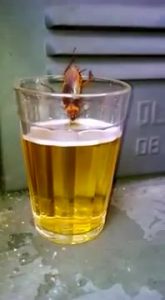
Simon, on the other hand, discovers a mythical alien race called the Clerun-Gowph, who accidentally populated most of the universe with messy scientific outposts that dumped waste products into the primordial soup of the planets they were studying. And the Clerun-Gowph, Simon is shocked to learn, are cockroaches.
This is a huge blow to the ego: Arthur discovers he’s nothing but a test subject in an experiment run by laboratory mice, while Simon realizes all life on Earth is just, as he puts it, the end of a process that started with cockroach crap.
5. The Planet-Sized Computer
Every seeker of truth needs an Oracle, and our heroes are no exception. In HGTTG, it seems Earth and all life on it were an enormous computer built in pursuit of the answer to life, the universe and everything (I know, I know — it was built to specifically help ask the question after another giant computer gave an accurate but useless answer — the point is that the whole planet is a computer).
When Simon, on the other hand, finally meets the Clerun-Gowph, he discovers they built a planet-sized computer to answer all the questions there are. Having nothing left to discover or learn, they decide to quit exploring/fertilizing the galaxy and devote themselves to drinking beer.
6. The Useless Answers (spoiler alert!)
At long last, our protagonists are about to learn the question to their ultimate questions. The problem is that in both cases, the answer is useless:
- Arthur’s question: “What is the ultimate answer to life, the universe and everything?”
- Answer: “42.”
- Possible alternate answer: “We apologize for the inconvenience.”
- Simon’s question: “Why are we created only to suffer and die?”
- Answer: “Why not?”
Don’t give me that look. I said they were useless answers, didn’t I?
- Who has, alas, shuffled off this mortal coil, but who is also, Saint Cajetan ever bless me, unable to sue me.
- Who has, alas, passed forever beyond the glass darkly, but who is also, godspeed, unable to sue me.
- Who, alas, never existed, but who also, may God ever make His face to shine upon me, was never able to sue me, be he alive or be he dead.
- Who, alas, is once more the ash whence he came, but who also, may his flagon of ale in Valhalla ever be full, unable to sue me.
- Who, dagnabbit, done went and bit the big one, but Lord willin’ an’ the creek don’t rise, ain’t gonna sue me.
